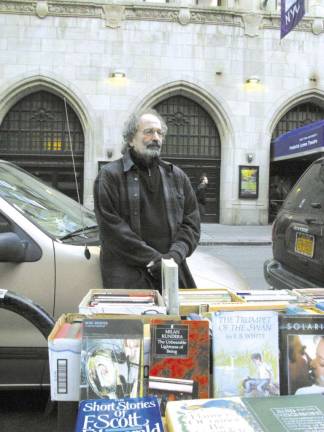Bookseller Braves Cold Streets, Lukewarm Market

Zachary Aptekar says the book-selling business isn't as robust as it once was
It's Saturday afternoon in November, sunny and brisk but not too cold - still decent weather for selling books. Zachary Aptekar has set up his tables just east of Washington Square Park, next to a food truck in front of the NYU Business Library. Toward the front, a row of books leans vertically against the boxes behind them, their covers visible to people walking by: Kurt Vonnegut, Catcher in the Rye, Sun Tzu's The Art of War. Most people glance at the books on display as they walk by, mildly curious, and keep walking, but a few pause and browse.
Zachary sits quietly in the open side-door of his mini van behind the tables of books. He's dressed against the chill in layers of wool sweaters, fingerless gloves, and wool hat over grey hair and a trim beard.
He's been selling books on the sidewalk since 1993, mostly in the blocks around the Washington Square Park, with occasional stints in Soho, St. Marks Place, and the Upper West Side. New York is a city of readers, but the customer demographic and the types of books people buy vary by neighborhood. On this stretch of West Fourth Street, his customers break down into four types: the university community, people just passing through between the subway stops in the East and West Villages, local residents, and from the spring through the fall, tourists heading for Washington Square Park.
Part of the book-selling business is talking about books, which Zachary clearly enjoys. He's content to sit quietly, letting people browse undisturbed, but if someone asks a question, he's quick to engage. He has a knack for subtly complementing the choices people make. An older man with thick glasses starts peppering Zachary with questions. "How much is the Jane Jacobs book? How much for the Mark Twain? Six? Done deal!"
"One of the five best American authors ever! Would you like a bag, sir?"
The book business has changed dramatically in the last couple decades, Zachary says, and mostly for the worse. Like many street vendors, he sells on the internet as well. He lists more expensive and obscure books online, and cheaper paperbacks and more broadly marketable titles he sells here. He gestures at the table. "From here to here is an assortment of fiction, classics, contemporary, poetry, a little bit of drama, some older editions, but not valuable. And then the other half is assorted non-fiction."
Under the first amendment, vendors selling art, music, and printed material aren't required to have a license from the city, although there are limits on where they can sell. So the barrier to entry is low, but finding a consistent supply of books that will sell well is not easy. Zachary buys most of his books in New Jersey, from both individuals and at larger book sales.
There are still book vendors in neighborhoods throughout the city, including Harlem, the Upper East Side, and Williamsburg, but the market doesn't support nearly as many vendors as it once did. When Zachary first started selling, there was a robust book vendor community in the West Village of around a dozen sellers. Now there are only a few other book vendors in the neighborhood, and business is not what it once was. People just don't buy as many books as they used to, Zachary says. "The numbers just keep going lower and lower. Retail sucks, in a word. I wish I were a salaried person with a predictable income."
The books that sell well change from day to day. Students make up much of his clientele during the week, but on the weekend, there are more out-of-towners (Zachary calls them bridge and tunnel people, although he's from New Jersey himself). He puts out books with more general appeal on the weekends. "Kahlil Ghibran or some of the more popular fiction. Most of the people passing by during the week, they're beyond all that. I might put out In Cold Blood or something like that, even though that still sells pretty well universally. Maybe something like this." He grabs a copy of Valley of the Dolls and puts it up with the other display books.
Some years back, when it got too crowded in the West Village, Zachary tried selling up on 72nd and Broadway. "It's probably the most literate neighborhood in Manhattan, if not the five boroughs." But there isn't a student population there. "I was able to sell hard covers, but paperbacks and the kinds of books that students buy didn't do well."
Many book vendors sell throughout the winter, but for Zachary, there are only a couple more good weekends left for selling books. He stops making the drive from New Jersey once the weather dips below about forty degrees. He focuses on his online sales in the colder months.
In the row of display titles at the front of the table, Jane Jacob's The Death and Life of Great American Cities sits a few spots down from The Death and Life of Malcolm X. That elegiac title phrase could also be applied to the book vendor business in New York, at least as Zachary describes it. "It was fun, at one point," he says, "with all those wonderful people, the camaraderie, the wonderful books that we'd see on each others tables, and the whole scene. It's not that any more. But I can make money at it, or I used to. So if that's still viable, and if I can physically still do it, I guess I'll be doing it."